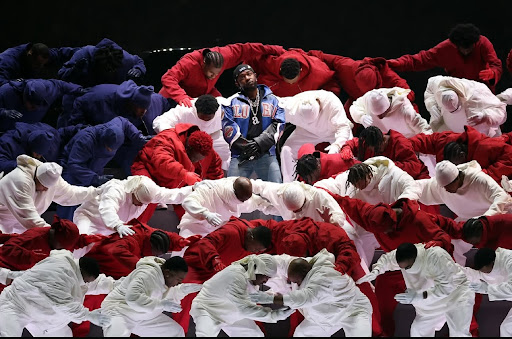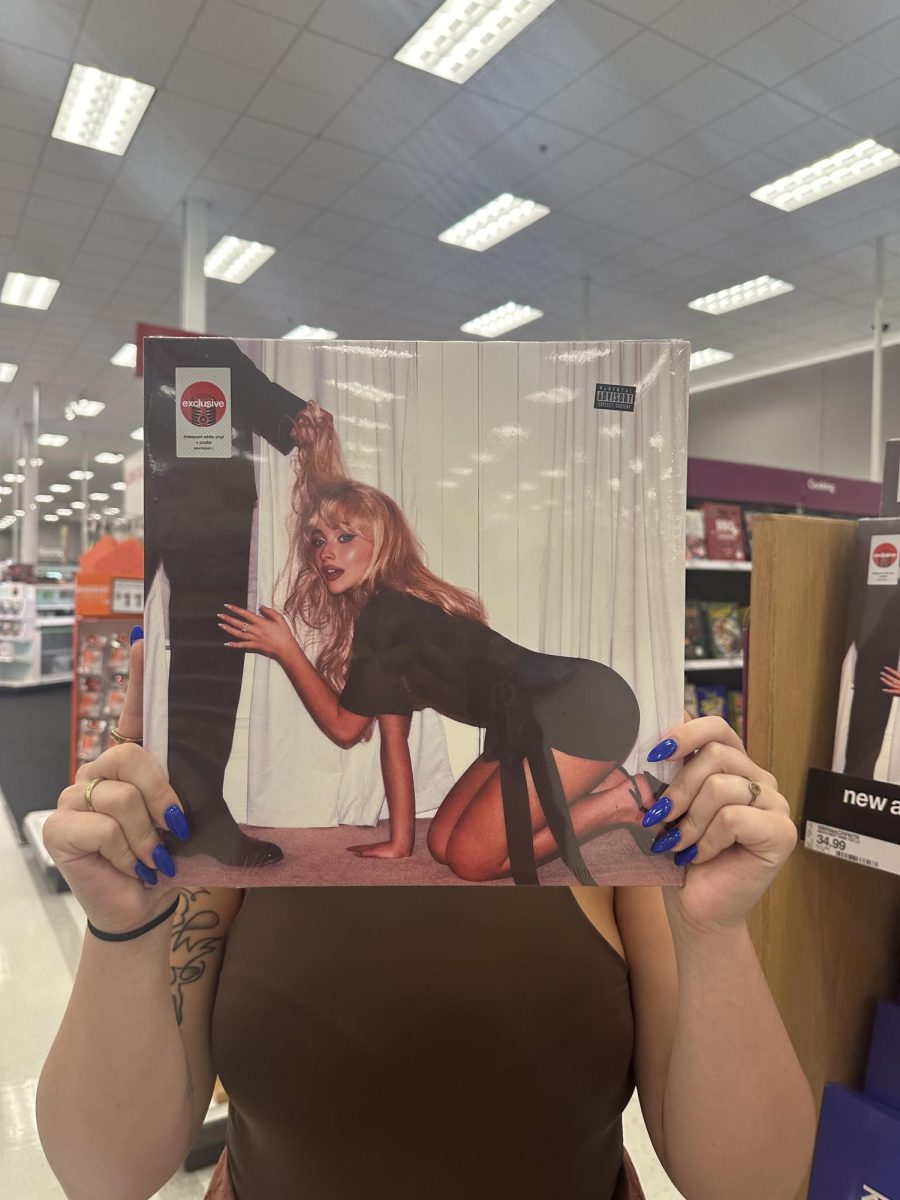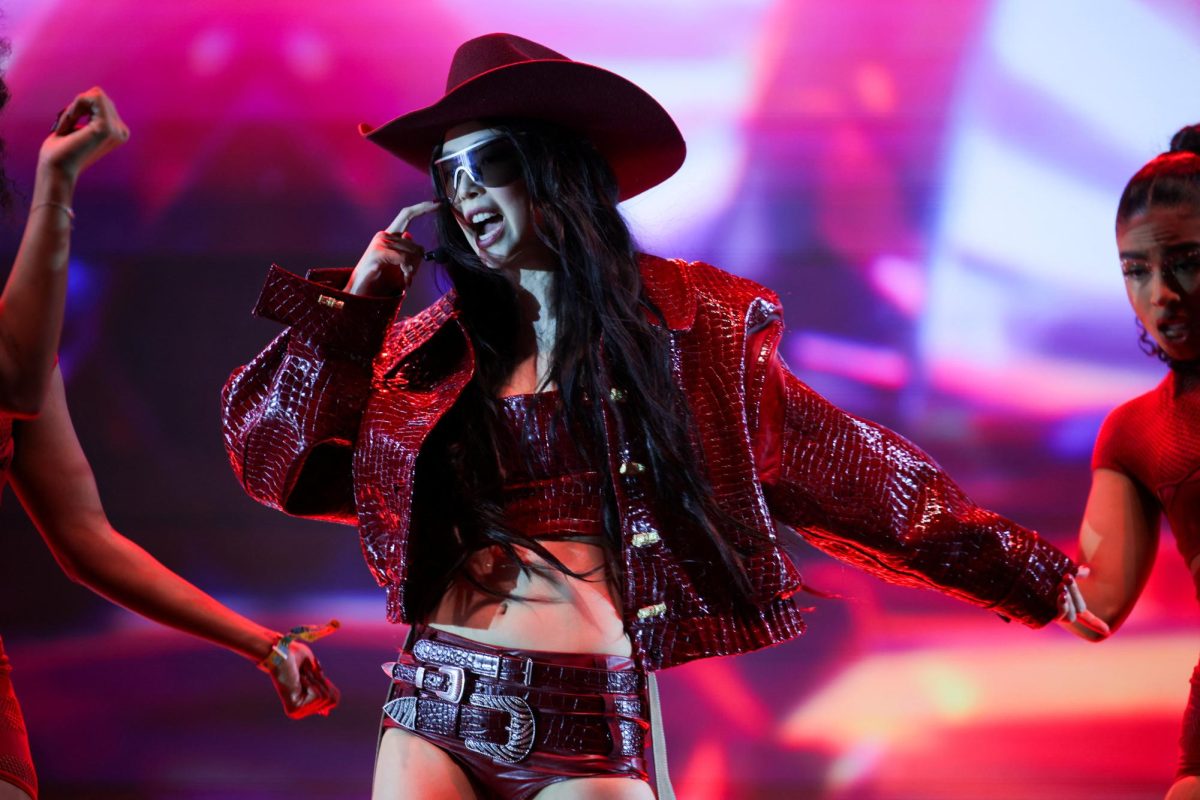
On Sunday, Feb. 9, an average of 127.7 million people tuned into this year’s Super Bowl halftime show. This marks an all-time historical high in viewership, with an increase of 3% from last year’s record, CNN reported. As such, one of the most well-regarded emcees, Kendrick Lamar, was selected to perform following a highly tumultuous year feuding with singer Drake and rattling hip hop culture with records such as “Not Like Us” and his album “GNX.”
It’s clear Kendrick is no stranger to making cultural statements and infusing meaning into every ounce of his work (“To Pimp A Butterfly” being a prominent example; a multilayered concept album that, through a narrated story of personal struggle, sheds light upon broader political and social issues which affect African Americans whilst emphasizing the importance of self-love and community empowerment).
It’s a common sentiment I’ve heard across social media: With K.dot, “Nothing is an accident.” “Everything is intentional.” Was his deliberate nature absent for this performance? Anything but—it’s on full display.
To begin, four geometrical icons appear reminiscent of the buttons on a Playstation controller. Samuel L. Jackson, portrayed as Uncle Sam, promptly introduces us to what he terms the “Great American Game.” After a performance of “Squabble Up,” he continues to scold Kendrick for being “Too loud, too reckless, too ghetto!” Surely, one can “win” the game by playing it safe and not being too disruptive? It’s implied we must play by the rules to make it somewhere in life and in regard to the entertainment industry, remain faithful to these guidelines so as to not risk losing it all. Ideally, we do what the government says without question even if injustice or corruption is present. Being “too ghetto” is ultimately a downside, even if it’s purely authentic as it is for Kendrick Lamar. Because authenticity isn’t prioritized when playing “The Game”—obedience is. Cognizant of his warning, Lamar performs “HUMBLE.” with an all-black entourage forming the American flag, potentially symbolizing the country being built off African American contribution. Despite this, the words “Sit down, be humble,” ring out as a commentary on subservience.
Eventually, the doo-wop rendition of “Man at the Garden” (a song where Lamar pridefully claims all fruits of his labor as rightfully deserved), provokes Uncle Sam to “deduct one life” as he comments on the presence of his homeboys—“the ol’ culture cheat code!” Kendrick cannot seem to reach a place of complete, unadulterated authenticity onstage without backlash if he goes “too far.” And if he were fully transparent and vocal with his experience, lifestyle and culture; he would’ve fallen off the tightrope and lost the American Game by now. As a Black man who is no stranger to welfare and gang culture growing up, inevitably some things he does or represents will not be immediately appreciated or even necessarily understood by many viewers, especially the 66 thousand attendees watching in person. I say this in light of the recent videos showing a dead silent crowd in some areas. Simply put, they are not the target audience.
Moreover, Uncle Sam exclaims “Oh, you done lost your damn mind!” after Lamar contemplates performing his biggest hit, “Not Like Us.” The song was tactfully hinted at throughout the show, which I believe did it justice for such a controversial yet culturally-shifting record. However, it also poses a risk for Kendrick Lamar to lose The Game, given its fundamental theme of hate. “Not Like Us” is the last straw. A mention of it reappears just after Sam commends Lamar for his obedience so far, with “Luther” and “All the Stars” being performed (SZA’s vocals never failing to disappoint—”Luther” is a song I now play to get out of bed). “That’s what America wants, nice and calm!” he assures.
But Kendrick thinks otherwise: “There’s a cultural divide” just as there’s one in his mind. Should he pursue his instincts, further solidify his (rightful) Drake hatred and perform a beloved record for the people? Or should he impede hatred from seeping into the Super Bowl LIX halftime show and keep it “nice and calm” like America prefers it? This is the artist’s dichotomy. Needless to say, Lamar wears a demonic grin directly into the soul of Aubrey Graham (Drake) through the camera as he accuses the celebrity of pedophilia on live national television. I’m convinced they purposefully amplified crowd noise for the “a minor” line (it’s worth mentioning Kendrick Lamar’s prominent “a” chain, which many believe to be another jab for “a minor,” yet I believe represents his media company pgLang as it’s the same font). Serena Williams, former American tennis player and one of Drake’s many ex-partners, also makes an appearance as she crip-walks to the chorus.
We finally end on “TV Off,” where the beloved DJ Mustard pops out to perform with Lamar. Note how a major motive underlying each of Lamar’s actions recently has been to spread and share the West Coast hip hop sound, effectively putting them on the map again. “Who put the West back in front of shit,” he raps on the title track “GNX.” Even more, it’s Kendrick Lamar representing his hometown and the place he came from. He’s single handedly brought the West Coast to millions of viewers while refusing to detach himself from the environment and culture of his youth. To Lamar, having integrity rests in showing respect to the culture and rap as an art form in general. It means giving back to those who made you who you are. The communities that deserve respect and empowerment just as everyone else. The people who’ve gone unnoticed or mistreated but are just as worthy of the top conditions.
Likewise, Lamar’s message almost serves as a meta commentary of what he’s participating in, because without Uncle Sam, perhaps there’d be no vehicle to land him in a position such as a Super Bowl halftime performer to begin with. But that doesn’t mean he stops delivering a message and switches lanes automatically. Unlike other artists such as Drake, he maintains integrity rather than play comfortably within the confines of America’s guidelines, forever producing hits destined for smooth sailing. As heard on the “Euphoria” diss, “I make music that electrify them, you make music that pacify them.” There’s a wild difference.
But as Uncle Sam makes clear, sometimes unapologetic authenticity isn’t understood nor completely accepted. And at its worst, it’s a crime. Still, Kendrick is going to do it anyways and knowingly receive a “GAME OVER” by the end. Similarly, I hope we can continue to move with integrity in a similar fashion even if it means pissing off the government sometimes a bit too. Surely that’s a sign we’re doing something right—power exists in the tension. And often power is only attained through it as well.



